PART IV - METHODOLOGY
Published online by Cambridge University Press: 19 January 2018
Summary
But attempts to find compelling extralogical principles that can provide us with perfect knowledge of abstractmathematical objects have largely stalled…. It seems likely that if one is aiming to justify one's axioms and basic concepts on broader grounds, one will ultimately have to attend to the roles they play in organizing our mathematical knowledge, and the role that knowledge plays in organizing and structuring our scientific experiences. [Avigad 2010]
We renounced on page 11 Tarski's goal of creating a methodology of the deductive sciences. More modestly, we have argued directly for the significance in mathematics of a particular methodology – formalization. In this last part, we heed Avigad's admonition and ‘attend to the role our concepts’ play in organizing mathematical knowledge. Having adopted a stance of local foundations, the choice of those axioms will be a part of the organization.
In Chapter 12 we explore the role of formalization in evaluating the purity of proofs, focusing on Hilbert's analysis of Desargues’ theorem, and conclude such a method is not sufficient. In Chapter 13, we consider Shelah's method of finding dividing lines as a general technique in developing an area of mathematics. We distinguish definition, classification, and taxonomy as different modes of organizing information and identify Shelah's dividing as creating a taxonomy.While Shelah originally applied his strategy only to the classification of first order formal theories, the technique readily extends to the formalism-free notion of abstract elementary class. Chapter 14 acts as a foil to the rest of the book. As opposed to our emphasis on the fruitfulness of formalizing mathematics, in this chapter we elaborate Kennedy's notion [Kennedy 2013] of formalism-freeness. It might seem that formalism-freeness is incompatible with the syntax–semantics distinction fundamental to model theory. We argue otherwise by considering several formalism-free approaches to specific areas of model theory that are formulated entirely semantically. Finally, we return to the relation between set theory and model theory by outlining connections of work in abstract elementary classes with large cardinal hypotheses. Chapter 15 rehearses the main points of the book to show how they support the argument.
- Type
- Chapter
- Information
- Model Theory and the Philosophy of Mathematical PracticeFormalization without Foundationalism, pp. 259 - 260Publisher: Cambridge University PressPrint publication year: 2018

